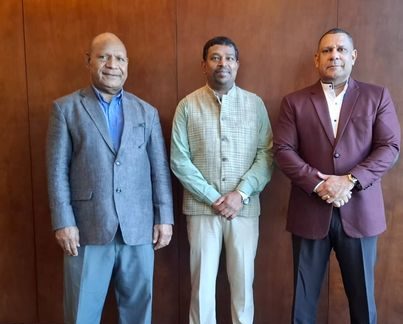The National Government is working with the Government of India to improve Papua New Guinea’s (PNG’s) electoral systems, as country makes preparations ahead of the General Elections in 2027.
Richard Masere, the Minister of Administrative Services, shared details about this collaboration in a statement released on Tuesday September 1st.
According to the Minister, discussions are ongoing between PNG and India to explore areas of cooperation, focusing on important changes in the electoral process, technology use, and building skills for the Electoral Commission. He said these talks aim to create a stronger and more efficient electoral system in PNG.
In a productive meeting with the Acting High Commissioner of India to PNG, Simon Sinai, the Electoral Commissioner, and Minister Masere discussed how to formalize this cooperation through a Memorandum of Understanding (MoU).
This agreement will not only involve both governments but also connect the Electoral Commission of PNG with the Electoral Commission of India. This partnership is seen as a crucial step in enhancing PNG’s electoral management.
Earlier this year, in May 2024, Masere led a delegation from the PNG government to India. This team, which included members of the Electoral Commission, participated in India’s Election Visitors Programme during the national elections.
This program provided valuable insights into India’s electoral management systems, which are recognized as effective and advanced. The delegation learned about Electronic Voting Machines (EVMs) and biometric technology used for voter enrolment and verification.
Masere highlighted that these experiences are vital as PNG looks to modernize its electoral processes. He said, “These learnings are vital as PNG explores new technologies to modernise its electoral processes and ensure transparency and accuracy.”
By learning from India, PNG hopes to improve the way elections are conducted in the country.
During their visit, the PNG delegation also met with the India International Institute of Democracy and Election Management (IIIDEM). They discussed how training and development programs offered by IIIDEM could help build the skills of personnel in the PNG Electoral Commission. These programs focus on practical election management skills, which could significantly boost the capacity of electoral staff in PNG.
Masere and his team also met with the Unique Identification Authority of India (UIDAI) to learn about India’s Aadhaar card system. This national ID system uses biometric technology to identify citizens. These discussions were essential for understanding how similar technology could be used in PNG’s own National Identification (NID) card system.
Masere explained, “These discussions provided critical insights into how PNG could potentially apply similar technology in its own National Identification (NID) card system, which could improve future voter enrolment and validation processes.”
The PNG government is committed to learning from international best practices, especially regarding biometric technology and Electronic Voting Machines. These technologies could play a significant role in improving the integrity of the voter enrollment and verification processes in future elections.
As part of this commitment, the Ministry, through the PNG Electoral Commission, plans to conduct a feasibility study. This study will evaluate how these technologies can be integrated into PNG’s unique electoral context. The government is also collaborating with the International Foundation for Electoral Systems (IFES) to receive technical assistance on various reform matters.
Masere stated, “We are also working closely with the International Foundation for Electoral Systems (IFES) for technical assistance on various reform matters, ensuring we adopt global best practices.” This collaboration aims to align PNG’s electoral practices with global standards and ensure a fair electoral process.
The recent 2022 Election Report presented to Parliament will serve as a foundation for ongoing discussions and reforms in PNG’s electoral system. This report highlights key outcomes and recommendations that the government plans to implement as they move forward with these reforms.
The Minister’s statement ended with him stating, “As we continue these efforts, our goal is to ensure that the electoral process in PNG is both transparent and credible, and that it reflects the democratic values of our nation.”

